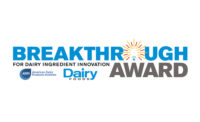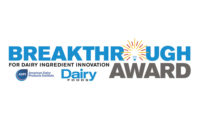Holistic health trend is driving dairy processor innovation
Consumers are looking for functional ingredients that support both physical and mental health.

Luke Chan via gettyimages.com
Consumer interest in the healthfulness of the foods they eat has been growing for some time. Moreover, there is evidence that the COVID-19 pandemic has only ramped up consumer interest in foods that deliver health benefits.
Data from Chicago-based market research firm IRI show which health claims grew the most — and the fastest — among what the market research company calls the “Dairy 15” — a wide-ranging grouping that includes milk, creamers, yogurt, ice cream, cheese, and several other subcategories. For the 52 weeks ending April 17, 2022, Dairy 15 products featuring claims of no/low/less sugar grew the most, up 11.3% to $2.8 billion in sales, followed by GMO-related claims (up 9.3% to $3.3 billion), lactose-related claims (up 5.4% to $3.7 billion) and natural sweetener claims (up 9.8% to nearly $2 billion).
While the milk category has had the most impact on claims’ growth, yogurt also looms large, and ice cream and frozen novelties play a significant role, too, says John Crawford, vice president, client insights, dairy for IRI.
“The more you can provide natural ingredients that show up on the label as something that consumers can understand … that’s a benefit,” he says. “Animal diet and animal wellness claims going to the top [of the list] has been more recent; sugar, no dairy, vegan and vegetarian have been at the top for a while. Pre[biotic] and probiotic and other digestion claims have been showing up high as well.”
Protein content has moved to the forefront of consumers’ minds, Crawford believes, while the definition of holistic health also has shifted toward plant-based products, for reasons including lactose avoidance, protection of the planet, and animal welfare, he says.
Clean label has grown in importance, and milk already fits in with that trend.
“The question becomes, are you going to add things into the product, or tout the natural benefits? I’ve been telling the milk industry they’ve lost the narrative,” Crawford says. “They don’t talk about the benefits that naturally occur. They assume consumers know that.”
Growing interest in holistic health benefits
Where consumers once defined healthful eating as the absence or reduction of things such as fat, sodium, carbohydrates, and cholesterol, they are now more likely to look for ingredients added to support health. For example, in the yogurt category, Chobani shifted the conversation away from yogurt as a “quote-unquote diet food” to an offering based on “nutrient-dense calories,” Crawford says.

“It’s a benefit of what you’re getting, not what you’re not getting,” he explains.
That’s in line with consumers’ growing interest in holistic health — and foods that support holistic health by boosting immunity or supporting mental and emotional health, for example.
Kat Crozier, senior customer marketing manager for Glanbia Nutritionals — with U.S. headquarters in Chicago — defines holistic health as expanding from the traditional physical health approach to an approach that also includes mental, emotional, and spiritual health.
“The definition of ‘health’ has evolved from reactionary treatment like medication to preventative health in everyday routines like daily exercise — and more mindful food choices,” she says. “There’s also a new focus on balance. Are my work and personal life in balance? Is there a balance in what I’m eating between what’s good for me and what’s good for the planet? Are my emotional and physical health in balance?”
Lindsey Ormond, director of nutrition and research for Eden Prairie, Minn.-based Milk Specialties Global, thinks the COVID-19 pandemic spurred more consumers into thinking more about holistic health — partly because they simply have had so much more time to think about their lives “rather than racing around all over the place.”
“It’s about taking responsibility for their health more than ever, and being proactive with that, rather than it being something that’s almost a second thought,” she says.
Dairy’s a winning delivery system
While dairy is known for offering healthful attributes such as protein and calcium, “it’s also a fantastic delivery system for functional ingredients like probiotics, vitamin D, choline for brain health, omega-3s — the list goes on,” Crozier says. “So dairy products can continue to fortify with the functional ingredients that consumers are demanding to provide an even more functional solution in each bite.”
Glanbia introduced a Health & Wellness cheese platform that features cheese varieties fortified with vitamins D and K, which promote bone health, as well as those with omega-3s, probiotics, added protein, and vitamin C and zinc for immunity.
“We also have an extensive bioactive ingredient portfolio with solutions that support the immune system, gut health, energy, and cognition,” Crozier says.
A&B Ingredients has noted the trend toward holistic health in general, and in natural foods in particular, says Joe O’Neill, vice president of sales and business development for the Fairfield, N.J.-based company. “People are looking for less-processed foods,” he says. “They’re concerned about allergenicity, immune health, and digestive health.”
Whether they’re making frozen products, cultured dairy such as yogurt, or dairy beverages, processors have various opportunities to improve holistic health through natural ingredients and a focus on food safety, O’Neill says.
A&B Ingredients suggests using clean-label preservatives such as the company’s CytoGuard product rather than synthetic preservatives; lowering fat content with natural ingredients such as corn and rice starches; boosting protein levels by using plant proteins such as Pisane pea protein; lowering sodium levels in products such as cheeses and dips by infusing them with natural sea salt, and stopping pathogenic bacteria through a label-friendly microbial such as the company’s CytoGuard LA.
Protein has been high on consumers’ list for some time — for overall health reasons and not just for building muscle — and dairy plays into that well, from Greek yogurt to nutrition shakes, Ormond says. Prebiotics and probiotics also have been popular, given the positive impacts on cognitive performance, stress, and overall well-being, she says, citing Greek yogurt once again. “They feel like they’re achieving something deep by having healthier options and being proactive in reducing stress,” she adds.
Products that Milk Specialties offers to dairy processors include MultaPro, a dairy protein ingredient for cultured products that enables “a smoother texture, creamy mouthfeel, improved gelation, and reduced whey separation,” the company says. Others are NutriPro lactoferrin, which provides immune support through bioactive properties; and NutriPro MFGM and whey protein phospholipid concentrate, which also provide high-quality whey protein and “support both body and brain.”
For its part, Chicago-headquartered ADM sees consumers taking a more proactive, long-term approach to overall well-being, including physical and emotional wellness. That means they are more aware of nutrition solutions to meet these goals, says Mike Medina, the company’s category marketing director, specialized nutrition, dairy, and private label. And consumers are increasingly conscious of how the gut microbiome impacts holistic wellness — the company’s research shows that 58% see that connection — which has boosted the popularity of products such as yogurt and kefir.
Dairy brands should be thinking about how to elevate those offerings and enhance others within the category, incorporating solutions such as prebiotic fiber, probiotics, and postbiotics, Medina says. To that end, ADM’s BPL1 and its heat-treated BPL1 counterpart target factors relevant to metabolic health. Meanwhile, the company’s spore-forming strain, DE111, helps with digestive health and immune function. All can withstand “harsh processing environments like high heat or pasteurization,” he says.
In partnership with Matsutani LLC, ADM also created a soluble prebiotic dietary fiber solution called Fibersol, which can be incorporated into milks or yogurts, boosts beneficial gut microbes, and can be tolerated at up to 68 grams per day, Medina says.
“Through our vast ingredient portfolio and formulation expertise, we help dairy brands create delicious options with appealing ingredients,” he says. “For instance, we blend our biotic solutions with our vast range of botanical extracts to seamlessly create shakes, yogurts, cereal treats, and more with both consumer-preferred attributes and appealing flavors, textures, and colors.”
Looking for a reprint of this article?
From high-res PDFs to custom plaques, order your copy today!





